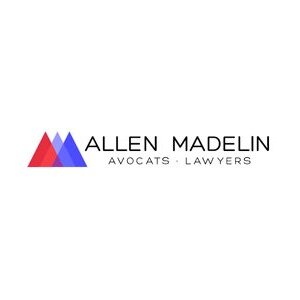Best Energy, Environment & ESG Lawyers in Montreal
Share your needs with us, get contacted by law firms.
Free. Takes 2 min.
List of the best lawyers in Montreal, Canada
About Energy, Environment & ESG Law in Montreal, Canada
Energy, Environment & ESG (Environmental, Social, and Governance) law covers a range of regulations and standards that address environmental protection, sustainable energy development, and responsible business practices. In Montreal, these legal areas ensure that energy production and use meet environmental standards and align with global sustainability goals. ESG also guides companies in transparent, ethical, and socially responsible operations. Businesses, property owners, municipalities, and individuals in Montreal must navigate a combination of federal, provincial, and municipal laws to remain compliant and foster a sustainable future.
Why You May Need a Lawyer
Legal assistance in Energy, Environment & ESG is critical in several situations. You may need a lawyer if:
- You are planning a new real estate or development project that may affect the environment and require permits, assessments, or community consultations.
- Your business is installing or operating renewable energy systems or exploring energy transition initiatives.
- You face government enforcement, fines, or disputes relating to environmental contamination or emissions standards.
- Your company is required to provide ESG disclosures or meet sustainability reporting standards for investors or regulators.
- You are involved in property transactions that need environmental due diligence and risk management.
- You want to pursue funding, grants, or incentives for green projects.
- You encounter neighborhood opposition or legal challenges regarding environmental impacts of your business or development.
A lawyer can help you understand your obligations, minimize risks, manage negotiations with authorities, and defend your interests if any legal actions arise.
Local Laws Overview
Montreal operates under a combination of federal, provincial (Quebec), and municipal frameworks when it comes to energy, environment, and governance regulations. Key considerations include:
- Environmental Protection: The Environmental Quality Act (Quebec) sets requirements for project assessments, pollution control, and waste management. Federal laws like the Canadian Environmental Protection Act may also apply to certain activities.
- Energy Regulation: Hydro-Québec oversees electricity supply and grid regulations. The government promotes renewable energy and energy efficiency while setting rules for resource exploration, distribution, and consumer protection.
- Land Use & Zoning: Montreal’s urban planning and zoning bylaws impose requirements regarding land development, green spaces, and construction activities to preserve environmental quality.
- ESG & Corporate Governance: Public companies must follow securities law for ESG disclosures, including requirements from the Canadian Securities Administrators on climate-related reporting.
Laws and regulations are complex and often require projects to be evaluated for their potential environmental impacts, with opportunities for public consultation and government approval. Non-compliance can result in significant penalties.
Frequently Asked Questions
What is ESG and why does it matter in Montreal?
ESG stands for Environmental, Social, and Governance. It refers to standards businesses follow regarding environmental practices, social responsibility, and ethical governance. In Montreal, ESG is important for compliance, investor relations, and maintaining a positive reputation.
Which government bodies regulate environmental and energy issues in Montreal?
Regulation is shared between Environment and Climate Change Canada (federal), Quebec’s Ministère de l'Environnement, de la Lutte contre les changements climatiques, de la Faune et des Parcs (provincial), and the City of Montreal. Hydro-Québec handles most electricity supply regulations.
When is an environmental permit required for a project in Montreal?
An environmental permit may be required if your project involves construction, emissions, waste management, water use, or development in protected areas. The specific requirements depend on the activity’s scope and location.
What are the penalties for violating environmental laws in Quebec?
Penalties can include administrative fines, cleanup orders, criminal charges, or project shutdowns. The seriousness of the violation and whether it is intentional can influence the type and amount of penalties.
How can a business ensure it complies with ESG standards?
Businesses should develop internal ESG policies, perform regular audits, keep up to date with regulatory developments, and, where appropriate, seek guidance from a legal professional.
Are there incentives for renewable energy projects in Montreal?
Yes, various incentives, grants, and financing tools are available for renewable energy, energy efficiency, and green building projects, offered by provincial ministries and agencies such as Hydro-Québec.
Can neighbors or citizens challenge the approval of an energy or development project?
Yes, citizens and community groups can participate in public consultations and, in some cases, legally challenge the approval of projects that may harm the environment or contravene local regulations.
What due diligence is recommended for property transactions?
Environmental site assessments (Phase I and II ESAs) are common to identify and mitigate environmental risks related to soil or groundwater contamination and to ensure compliance with zoning and environmental bylaws.
What is an environmental impact assessment?
An environmental impact assessment (EIA) is a study required by law for certain projects to evaluate the potential effects on the environment and recommend measures to prevent or mitigate harm.
What records and reports are companies required to keep?
Companies must keep detailed records of emissions, waste, and compliance with permits. Public companies may also have to file annual reports including ESG metrics and climate-related risks.
Additional Resources
Several resources are available for individuals and businesses seeking information or help in energy, environment, and ESG matters in Montreal:
- Quebec Ministère de l'Environnement, de la Lutte contre les changements climatiques, de la Faune et des Parcs
- Environment and Climate Change Canada
- Hydro-Québec
- City of Montreal - Environment and Sustainable Development Department
- Canadian Securities Administrators (for ESG disclosures)
- Montreal Climate Partnership and other local environmental organizations
- Barreau du Québec (Quebec Bar Association) for referrals to qualified lawyers
Next Steps
If you require legal advice or representation in Energy, Environment & ESG matters in Montreal, it is important to:
- Gather all relevant documents, permits, correspondence, and reports related to your issue.
- Contact a lawyer who specializes in energy, environmental, or corporate governance law. The Barreau du Québec’s referral service can help you find the right legal professional.
- Prepare a clear summary of your concerns, objectives, and any deadlines you may face.
- Stay informed about regulatory requirements and upcoming changes in legislation that may affect your situation.
- Consider reaching out to relevant governmental departments or community organizations for preliminary guidance or support.
Taking prompt action and consulting an experienced lawyer will help you navigate the complex legal landscape, avoid potential pitfalls, and ensure your projects or business remain compliant and sustainable.
Lawzana helps you find the best lawyers and law firms in Montreal through a curated and pre-screened list of qualified legal professionals. Our platform offers rankings and detailed profiles of attorneys and law firms, allowing you to compare based on practice areas, including Energy, Environment & ESG, experience, and client feedback.
Each profile includes a description of the firm's areas of practice, client reviews, team members and partners, year of establishment, spoken languages, office locations, contact information, social media presence, and any published articles or resources. Most firms on our platform speak English and are experienced in both local and international legal matters.
Get a quote from top-rated law firms in Montreal, Canada — quickly, securely, and without unnecessary hassle.
Disclaimer:
The information provided on this page is for general informational purposes only and does not constitute legal advice. While we strive to ensure the accuracy and relevance of the content, legal information may change over time, and interpretations of the law can vary. You should always consult with a qualified legal professional for advice specific to your situation.
We disclaim all liability for actions taken or not taken based on the content of this page. If you believe any information is incorrect or outdated, please contact us, and we will review and update it where appropriate.
Browse energy, environment & esg law firms by service in Montreal, Canada
Montreal, Canada Attorneys in related practice areas.











